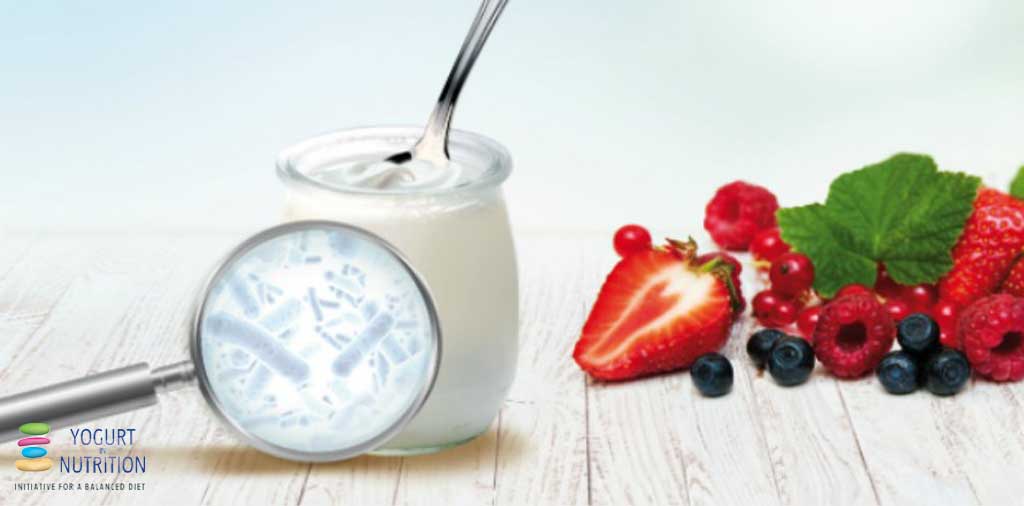Ever wondered what yogurt with live cultures really means for your health? Live yogurt contains trillions of friendly bacteria which experts believe may play a vital role in a raft of health benefits. But first the bacteria must reach the large intestine where they can do their good work. The authors of this article explain the challenges these bacteria face on their journey, and some of the benefits they may provide.
The yogurt cultures that ferment milk to form yogurt are the bacterial species Streptococcus thermophilus and Lactobacillus delbrueckii subsp. bulgaricus. Other microbes may also be involved in the manufacture of fermented milks – such as the probiotic* bacteria Bifidobacterium and Lactobacillus strains – to provide extra health benefits.
Although these bacteria in yogurt may not survive for long in the gut, they help to balance the gut microbiota and may contribute to our good health, say the authors.
Bacteria in yogurt survive in the gut
However, the community of bacteria that normally live in our intestine – the gut microbiota – usually resists colonisation of the gut by bacteria introduced from outside the body.
Simply reaching the colon is a perilous journey for the yogurt bacteria. After ingestion, the intrepid travellers must run a gauntlet through the hostile environment of the gastro-intestinal system. Even the mouth is a dangerous place, as saliva contains enzymes with anti-microbial effects. The next hurdle is the acidic conditions of the stomach and its digestive enzymes. Then there are the bile salts in the small intestine – another threat for bacterial travellers.
Yet despite all these hurdles, a good proportion of the yogurt bacteria do survive and make it to the colon where they interact with the resident bacteria.
‘Several reports suggest that microorganisms present in fermented foods may also affect the gut microbiota, at least transiently.’ – Kok & Hutkins, 2018.
Yogurt and other fermented foods may improve health
Yogurt and other fermented dairy foods have been linked to various health improvements, including reduced risks of obesity, type 2 diabetes, heart disease, bladder cancer and colorectal cancer.
Promising results are emerging from studies looking at the specific health effects, both of the bacterial strains in traditional yogurt and of the probiotic strains that may be added during its manufacture. These effects may be seen, for example, in their association with improved levels of blood glucose and insulin, key factors in the development of diabetes.
Bacteria make yogurt suitable for lactose malabsorption
Milk and dairy products contain lactose, a natural sugar that is broken down in the intestine by the enzyme lactase. Levels of lactase in the gut decline after infancy but most adults still have enough to digest most of the lactose they eat.
However, some people don’t produce enough lactase and suffer uncomfortable symptoms, such as diarrhoea, gas and bloating. Most of these people can tolerate some lactose, and yogurt is often recommended as a dairy food suitable for them. Although yogurt contains lactose, the live bacteria in yogurt contain lactase which is released in the intestine where it assists with lactose digestion.
Experts at the European Food Safety Authority (EFSA) have concluded that a cause-and-effect relationship between yogurt consumption and improved lactose digestion is sufficiently established to justify a health claim, as long as the yogurt contains a threshold level of live bacteria (at least 108 colony-forming units, CFU per gram).
Diets rich in fermented foods such as yogurt are likely to contribute a large part towards the millions of microbes we ingest every day through our food, say the authors. They conclude that, although this intake of microbes from fermented foods is only transient in the gut, a growing body of evidence suggests that it can influence our resident microbe community and so give us our own individual health benefits.
Find out more: read the original article.
Source: Kok CR, Hutkins R, Yogurt and other fermented foods as sources of health-promoting bacteria , Nutrition Reviews, Dec 2018, Volume 76, Supplement_1, 1 : 4-15
This article is part of the published proceedings of the 2017 YINI Summit, organized in Buenos Aires during the International Congress of Nutrition on the “Yogurt, gut microbiome and health: from potential mechanisms to dietary recommendations“.
This article is published in Nutrition Review Supplement, Vol 76 (Supplement 1), Dec 2018
* Probiotics are live microorganisms that, when administered in adequate amounts, confer a health benefit on the host.



